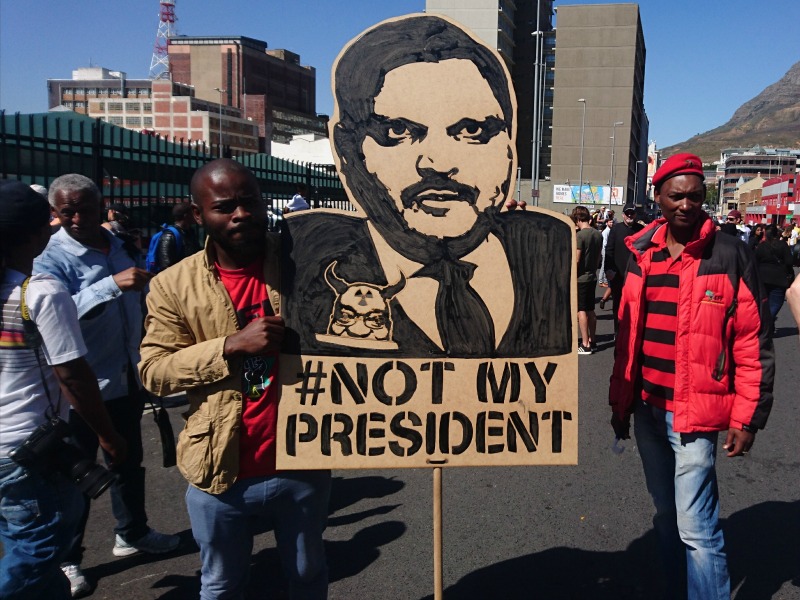Arun Sudhaman 04 Sep 2017 // 11:57AM GMT

LONDON — Bell Pottinger, the UK PR firm accused of stirring up racial tensions in South Africa, developed a campaign that was "in breach of relevant ethical principles" and "potentially racially divisive", according to a review into the scandal by law firm Herbert Smith Freehills.
Bell Pottinger revealed findings from the review today, preceded by CEO James Henderson's resignation for his role in the crisis. While the full report is not published, a three page summary of findings reveals that the PR firm's work for Gupta family conglomerate Oakbay Investments included certain material that "that was negative or targeted towards wealthy white South African individuals or corporates and/or was potentially racially divisive and/or potentially offensive and was created in breach of relevant ethical principles."
This material was based on the decision to adopt a narrative of 'economic emancipation', on behalf of the Gupta company, which is closely linked to South African President Zuma. Herbert Smith does not believe that this decision constituted an "ethical lapse...per se", but critics contend that the depiction of Zuma's opponents as agents of 'economic apartheid' represents an attempt to sow racial division on behalf of the Guptas.
The law firm states that Bell Pottinger's senior management "should have known that the campaign was at risk of causing offence, including on grounds of race. In such circumstances BP ought to have exercised extreme care and should have closely scrutinised the creation of content for the campaign. This does not appear to have happened."
On more serious charges, including whether Bell Pottinger invented the phrase 'white monopoly capital' or deployed armies of Twitterbots to spread fake news, Herbert Smith finds no evidence to support the claims. However, it does find evidence "that the BP account team used other tactics in relation to the economic emancipation campaign which arguably breached the relevant ethical principles, including taking steps which might mislead or undermine journalists who were asking questions in relation to the campaign."
The report holds Bell Pottinger's senior management accountable for a string of lapses in oversight. "Members of senior management should have taken care to ensure that the BP account team was structured appropriately for such a sensitive mandate," it reads.
"Further, there are certain instances where members of senior management were provided with information or confirmations by the account team in relation to the work being done which were inaccurate and misleading. However, there were a series of opportunities for certain members of senior management to discover these matters which were missed. In addition, members of senior management with day-to-day supervisory responsibility failed to put in place policies and procedures to minimise the risks associated with this account, including any formal process for the ongoing monitoring of the account and the work being done."
The report also notes that its scope was limited by the confidentiality provisions surrounding the work for Gupta conglomerate Oakbay Investments. In addition one member of the account team declined to take part in a more detailed interview with Herbert Smith.
The report is unlikely to satisfy the vociferous critics of Bell Pottinger's conduct in South Africa. Phumzile Van Damme, Shadow Minister of Communications of South Africa's opposition Democratic Alliance party described it as "a poor attempt by Bell Pottinger to appear to be taking responsibility for the unethical campaign they ran on behalf of the Gupta family and, President Jacob Zuma’s son, Duduzane Zuma."
Van Damme called on Bell Pottinger to release the 45,000 documents that Herbert Smith reviewed for "for our own review on behalf of the South African public."
Henderson, for his part, said in a statement today that the report made it clear that "the business requires a change of leadership to fix the problems of the past and to move forward."
"Although I neither initiated nor was involved in the Oakbay work, I accept that as CEO, I have ultimate executive responsibility for Bell Pottinger," said Henderson. "I feel deeply let down by the colleagues who misled me. However, I think it is important I take proper accountability for what has happened. "I have also striven to put the best interests of Bell Pottinger and its brilliant staff first, and it is for that reason that I am stepping down today."
Henderson is understood to own 37% of Bell Pottinger with his fiance Heather Kerzner. The firm is expected to be expelled from the UK's trade association for PR firms (PRCA) tomorrow, after appealing a decision that found it guilty of stoking racial tensions in South Africa, following a complaint by the Democratic Alliance.
"The DA looks forward to the release of the PRCA’s report on Bell Pottinger tomorrow," added Van Damme. "This report, by an independent organisation, not one hired by Bell Pottinger themselves, will inspire more confidence."
It is understood that Bell Pottinger directors are considering all options regarding the future of the business, which has been debilitated by the ongoing South African scandal. The affair has already resulted in the sacking of lead Bell Pottinger partner Victoria Geoghegan and the suspension of three other executives. The DA has also called on Bell Pottinger's clients to desert the firm — with Henderson admitting to the BBC that the work has cost it relationships with key customers. These include Richemont, Investec and Tourism South Africa.
The Herbert Smith report also includes a six-point plan for Bell Pottinger to "learn lessons from this review, take appropriate action and instigate all necessary measures to ensure that the agency meets the highest ethical and industry standards which it has always endeavoured to uphold."
These include an 'engagement committee' to review and identify 'high-risk' work, further training of staff on social media management, and the creation of an 'ethics committee'. The report can be found here: Findings of Herbert Smith Freehills Review


































.jpg)

















